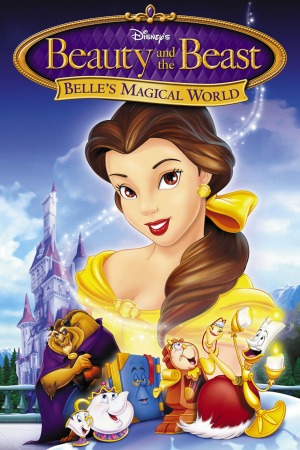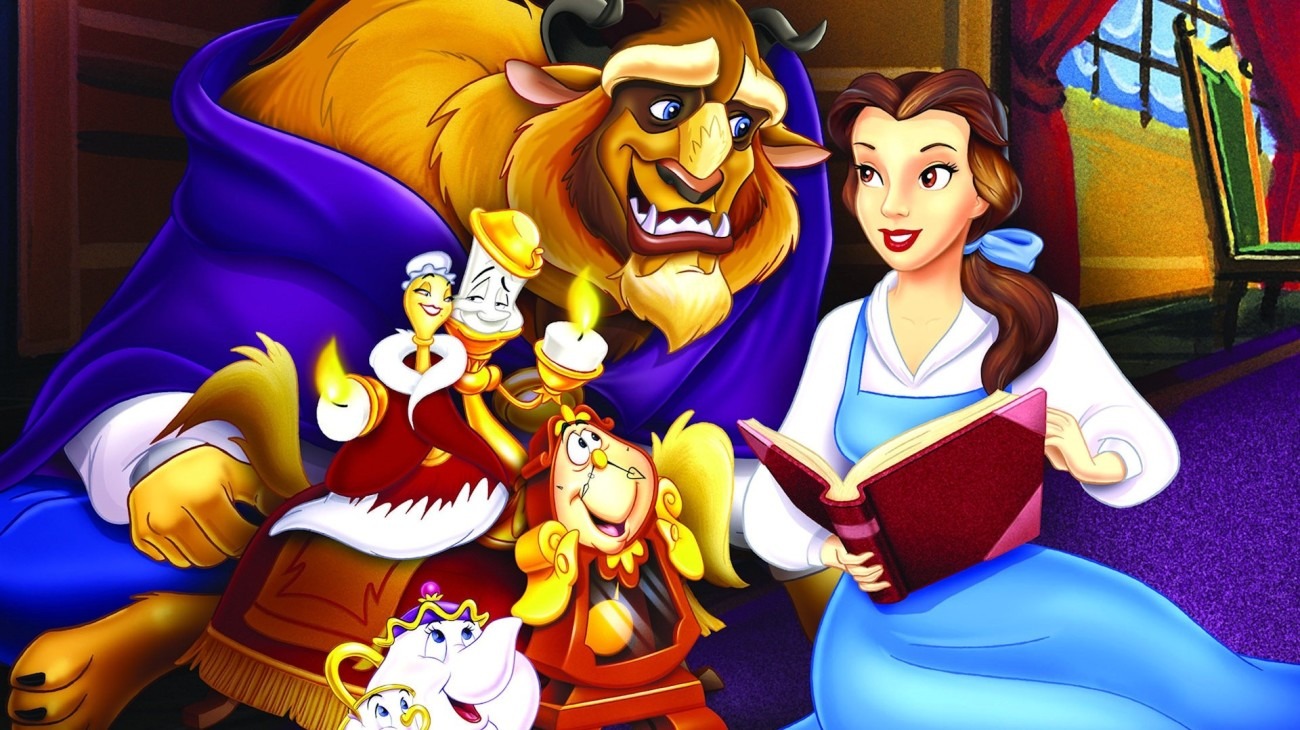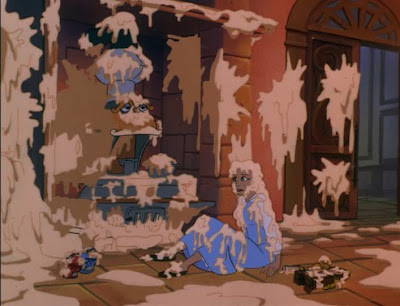
Disney Sequels: New, and a bit alarming
First, the petty, niggling point: by the strictest definition, Belle's Magical World and Beauty and the Beast: Belle's Magical World are two different features. Initially, the second sequel - if that's even the right word - to the luminous Disney classic Beauty and the Beast was released under the shorter of its two titles on VHS in 1998 with a running time of about 70 minutes. It consisted of three short stories, each of them an awfully convenient 22-ish minutes, and it has been broadly assumed, though not ever officially confirmed that I am aware, that it was the artlessly stitched together compilation of three completed episodes from a Beauty and the Beast television series that never materialised. The fact that the fades-to-black for the commercial breaks were left intact has helped solidify this impression. Then, in 2003, the film was released to DVD, with the fuller version of the title tacked on, along with an extra 22 minutes in the form of a fourth episode, one which had first seen the light of day in a long-forgotten DTV object called Belle's Tales of Friendship. This 92-minute version of the film was sold as being a "Special Edition", on account of the people at Buena Vista Home Entertainment having a really warped idea about what the word "special" means.
This is a fucking bad movie. I don't even know if dignifying it with that sacred word, "movie" is appropriate; it's not quite up to the level of anthology film, certainly less a "feature". It's trash, literally: something that wasn't good enough for its intended purpose, and so Disney slapped a box on it and charged money for it and pretended that a rickety collection of insultingly simplistic morality plays qualified as a "sequel" to anything. Forget Beauty and the Beast; this is dreadful enough to make a mockery out of Beauty and the Beast: The Enchanted Christmas. It is devoid any appeal on any level, devoid even of basic functionality as an object.
Set entirely in the same winter as The Enchanted Christmas, which is to say, entirely within the montage covered in the original feature by the song "Something There" (and "Human Again", if you're one of those folks what hold truck with the extended cut), Belle's Magical World tells of the everyday sort of activities that happened to poor proto-feminist Belle (Paige O'Hara) during her time in an enchanted castle full of humans-turned-household-objects, all ruled over by a cruel, petulant Beast (Robbie Benson). It's rather difficult to imagine that there was even room for 65 distinct adventures in the time frame involved, but something tells me that rigorous logical fidelity to the Beauty and the Beast universe wasn't high on the writers' list of priorities. Chronology and character development aren't even big enough concerns for me to call them "secondary"; they are incidental, at best. Hence in one segment, it is pointed out by Mrs. Potts (Anne Rogers) that Belle is brand new to the life in the castle; elsewhere in the film - even in that same segment - Belle acts as though she's known all these characters for years and has come to appreciate their tiny foibles.
Let us, anyway, consider the thing on a segment-by-segment basis, starting with "The Perfect Word", in which writer Richard Cray introduces us to several of the fun new characters we'd come to despise even more in the context of a series than in this one off: Webster the dictionary (Jim Cummings), an off-putting know-it-all, LePlume the fountain pen (Rob Paulsen) , and Crane the ream of writing paper (Jeff Bennett), and it was this last character who got me to noticing that Belle's Magical World seems to have completely forgotten that all these enchanted objects are actually people who have been transformed; it's not just that every goddamn thing in the castle is a talking, I don't know, a talking inkwell or a pair of talking knitting needles. Talking paper, that never runs out of paper? Apparently? Christ, I hope he doesn't run out of paper. What would that even look like? I wonder if that would have been a plot of a late episode: Crane is about to run out pages, and uses the last one as his suicide note.
We are also introduced to Chandeleria (April Winchell), whose name would have been rejected by the writers of He-Man for being too dumb;* she is a chandelier who exists to make fun of the deaf. I'm not even kidding. Something close to 100% of the scenes involving her consist of her mis-hearing what other characters say, and repeating it back in a mangled way, for the purpose of some manner of alleged comedy. Like so: "You'll spoil the mood!" says Lumiere. "Boil the food? Goodness no, that's the cook's job", says Chandeleria. "Burble gurgle gush", goes the blood streaming out of my ears.
In "The Perfect Word", Belle and the Beast get into a fight, and both demand an apology; Webster, LePlume, and Crane come up with a brilliant scheme to get the ball rolling by forging a letter of verbose apology from the Beast, which causes Belle to enthusiastically run to him and express her own apology, for the unbelievable sin of getting upset that he is such a monstrous, violent bully. Because if there's one thing the Beauty and the Beast sequels want to make sure of, it's that we don't ever lose sight of how unhealthy the basic relationship dynamic is here.
Anyway, a whole bunch of sitcom-ready misunderstandings ensue, and we all learn about how easy it is to forgive your abusive boyfriend. Huzzah!
Next up is "Fifi's Folly", Fifi (Kimmy Roberts), being the unnamed feather duster from the original feature so madly in love with the cavalier seducer Lumiere (Jerry Orbach). Their anniversary is coming up, and Belle takes it upon herself to force Lumiere to do something nice - the unspoken implication of most of these stories is that everything would be much better if Belle would just stay the hell out of everybody else's business - which Fifi overhears and misinterprets as Lumiere and Belle plotting to have an affair. This is what the feather duster thinks. About her candelabra boyfriend. And a human woman.
This unbelievably disgusting subplot being insufficient to support 22 minutes, it gets cleared up in time for the two lovers to go on a sleigh ride in a sentient, but sadly unnamed punch bowl, that nearly ends in tragedy when they all almost go over a cliff, except they are saved. I want to spend as little time as possible hunting for the message of this sequence, which is some variation on "sexual jealousy blinds your judgment", and is thus an awkward fit for a movie aimed at particularly undiscerning seven-year-olds.
Third comes "Mrs. Potts's Party", the segment added in 2003. Mrs. Potts has what is fairly unambiguously seasonal affective disorder; Belle decides that everybody should throw a party to make her feel better. The problem is, she leaves Lumiere and Cogsworth (David Ogden Stiers) in charge of making all the decisions about music, food, and decoration; they very nearly ruin everything by disagreeing on each and every point. A light French ditty vs. a serious, rousing piece of chamber music; roses vs. lilies; and worst of all, angel food cake vs. devil's food, the last duel becoming even worse since the two feuding friends manage to drag a pair of presumably married talking oven mitts, Tres (Paulsen) and Chaude (Winchell), into their fight; and if everything else about the movie so far hasn't sent you into a spiral of misery, the ghastly sight of sentient oven mitts, looking vaguely like fireproof dolphins, ought to do the trick.
In truth, I am pleased this sequence was added; it is by far my favorite, on account of being by far the most deranged. Lumiere and Cogsworth, attempting to keep the party from Mrs. Potts, are obliged to hide all their flowers in the Beast's room, where lies in sleep so deep that it's probably fair to call it a coma, which is a step up from not appearing at all in "Fifi's Folly". Tres and Chaude, a wildly annoying pun, are even more problematic and unlikable characters than the deeply unappealing LePlume, Webster, and Crane (who, regrettably, put in another appearance in this sequence), but they are also weirder and thus somehow more charming. And the message is absolutely delightful: kids, if your friends are suffering from the symptoms of clinical depression, badger them into being happy. No, really, the theme is "cooperate, for God's sake, before you burn down the kitchen", but I like how Belle completely fucks with Mrs. Potts and thinks she's done a good deed.
We end on "Broken Wing", in which Belle saves a bird from the cold - but ah, the Beast hates, hates, hates birds, and so the first act is spent hiding it in manic ways. After the commercial, we find that the Beast likes this bird, because it sings pretty, and so he throws it in a cage and demands it sing, terrifying it and the whole castle staff, before he learns the value of not screaming until you get your way. He does not, however, learn to free prisoners who are not birds, and Belle doesn't seem concerned with suggesting that he might. Of all the sequences of Belle's Magical World, "Broken Wing" is the one that most suggests her magical world is a daily hell of being emotionally and sometimes physically threatened by a raging psychopath with no empathy for any other being; and boy, does Belle absolutely not mind that lifestyle at all. Michael Haneke and Lars von Trier couldn't tag-team on a more harrowing, unpleasant experience than this deeply unsettling psychological torture.
In the subplot, Cogsworth learns exactly what the Beast learns, and without any indescribably icky male power/woman as passive object overtones. So they could have, maybe, just promoted it to the A-plot, but then we'd have had even less of the Beast, and that would be... bad? I don't know. The Beast we get is pretty bad all on his own.
Belle's Magical World is straight-up awful. The stories are trite, the characters are annoying, and the animation is chintzy as hell. And not just that: it's such a cheap, degraded version of the original characters that it looks not so much like an officially sanctioned spin-off of Beauty and the Beast, as it does some gruesome Eastern European knock-off that was trying to suggest the original character models without getting so close as to trigger a lawsuit. Seriously, recall the original Belle and Beast-
-and then try to tell me that the Belle's Magical World incarnation of the characters bear more than a passing resemblance.
The actors, bless them, don't seem to realise that they are saying horribly stupid things in a hackneyed scenario, and still put in the effort they have through two other features, though Angela Lansbury's absence is felt, painfully: Anne Rogers's stab at mimicking Lansbury's cockney teapot is a horribly mangled collision of accents that suggest someone's impression of Vanessa Redgrave playing Eliza Doolittle.
But of all the flaws, picking on the acting is the least sporting, and the least significant: the whole damn project is dreadful, from the twisted and broken character designs, to the screeching "HAHA, AND NOW WE HAVE LEARNED A LESSON!" moralising that brings each segment to a staggering close, to the rancid pair of songs Belle sings at the end of the episodes that ran short, songs that I'm not even going to bother talking about, because fuck 'em, they're so bad.
Bad sequel? Aye, a bad sequel - a pointless, empty-headed sequel that manages to not only miss the heart and souls of the characters from the original, it can't even settle on a characterisation for any of them that's consistent within itself. But calling Belle's Magical World a bad sequel is underselling it so very much: this is a bad everything, so mindlessly divorced from anything that made its predecessor work that it barely even seems to be a continuation of the same world at all; more like a horrible dream that comes the night after watching Beauty and the Beast while in the throes of a particularly brutal fever.












